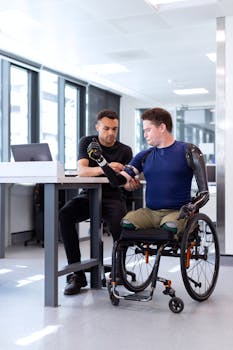Revolutionizing Healthcare: The Transformative Power of AI in Medicine
The healthcare industry is on the cusp of a technological revolution, driven by advancements in Artificial Intelligence (AI). AI in healthcare promises to transform patient care, streamline administrative processes, and accelerate medical research. By leveraging machine learning algorithms, natural language processing, and robotics, AI can analyze vast amounts of data, predict disease outbreaks, personalize treatment plans, and even perform complex surgeries. This post explores the multifaceted impact of AI on healthcare, highlighting its applications, benefits, and future potential.
Applications of AI in Healthcare
AI is being integrated into various aspects of healthcare, from diagnostics to treatment and patient monitoring. One of the most significant applications is in medical imaging, where AI algorithms can analyze X-rays, MRIs, and CT scans with remarkable accuracy. These algorithms can detect anomalies that human eyes might miss, leading to earlier diagnoses and better outcomes for patients.
AI-powered chatbots and virtual health assistants are also becoming prevalent. These tools can provide 24/7 support to patients, answering queries, scheduling appointments, and even monitoring symptoms in real-time. For instance, AI-driven apps can remind patients to take their medication, track their vital signs, and alert healthcare providers if there are any concerning changes.
Benefits of AI in Healthcare
The integration of AI into healthcare offers numerous benefits. One of the most significant is improved diagnostic accuracy. AI can process and analyze large datasets much faster than humans, identifying patterns and correlations that might be overlooked. This leads to more accurate diagnoses and personalized treatment plans.
AI also enhances operational efficiency in healthcare settings. Administrative tasks such as scheduling, billing, and patient record management can be automated, reducing the burden on healthcare staff and allowing them to focus more on patient care. Additionally, AI can help in predicting patient flow and resource allocation, ensuring that hospitals and clinics operate smoothly even during peak times.
Future Potential of AI in Healthcare
The future of AI in healthcare is incredibly promising. As technology continues to evolve, we can expect to see more sophisticated applications that further revolutionize the industry. For example, AI-driven drug discovery could significantly accelerate the development of new medications by analyzing vast amounts of biological data and simulating molecular interactions.
Robotic surgery is another area where AI is making strides. Robots equipped with AI can perform complex surgeries with precision and minimal invasiveness, reducing recovery times and improving patient outcomes. Moreover, AI can assist in personalized medicine by analyzing a patient’s genetic information to tailor treatments specifically for them.
Conclusion
The integration of AI into healthcare is transforming the way we approach medical care. From improving diagnostic accuracy and operational efficiency to enabling personalized treatment plans, AI offers a multitude of benefits that can enhance patient outcomes and streamline healthcare processes. As technology continues to advance, the potential for AI in healthcare will only grow, paving the way for a future where medicine is more precise, efficient, and accessible than ever before.
“`